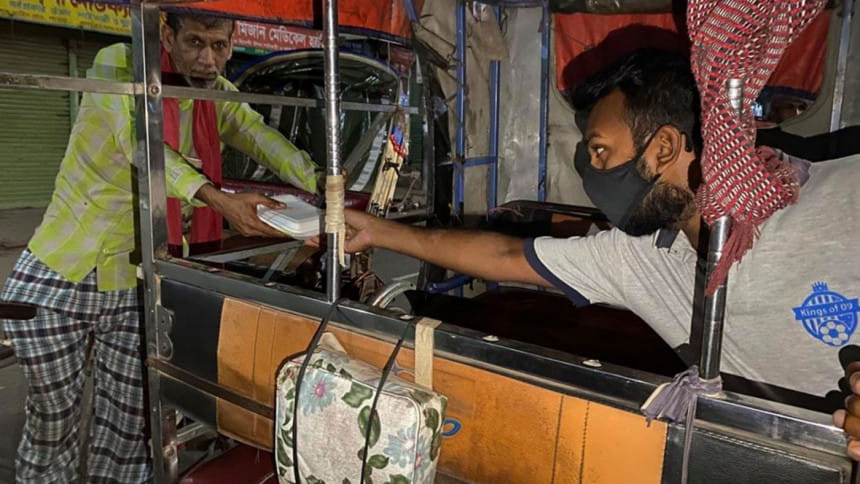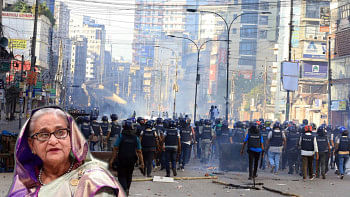Our silent, resilient saviours

At a time when most people are struggling to choose between life and livelihood, there are members of our society who have been going out of their way to help make life easier for those who have been afflicted by the virus. Volunteers, many of them very young and from all backgrounds, have been working across the country since the beginning of the Covid-19 pandemic last year. Despite all the challenges of working in risky circumstances they seem undefeated and unstoppable.
These volunteers belong to both organisations that have been doing charitable work even before the pandemic broke out as well as those that were mobilised in response to the dire situation that the Covid-19 has placed us in. Either way, the common motivation has been the pure desire to help people in need.
In fact, the pandemic has given an impetus to volunteerism along with innovative ways to reach out to people. As early as March of last year, for instance, when the virus had first made its presence known in Bangladesh, the non-profit social welfare organisation Bidyanondo set up water taps, basins, and hand washes along a wall in Pallabi. They also began making and donating PPEs following their high demand in the health sector, spending days and nights working with very few volunteers (for safety reasons) and refusing to sell the PPEs (when they were quite scarce in the market) even when offered very high prices for them, as stated in one of the organisation's Facebook posts.
While volunteerism is nothing new, and many of the organisations have been working for one cause or another for years, the job is especially meaningful at a time when such a fast-spreading deadly virus is ravaging our people. The individuals who are volunteering now, be it by distributing food or as assistants in vaccination centres, are putting their own lives and the lives of their loved ones at great risk. In return, they get only the appreciation and blessings of those they help—and that seems to be enough.
Take Samia Haque. A student of the Department of Biochemistry and Microbiology at North South University, Samia has been working as a Red Crescent Youth volunteer, among many others, at the Bangabandhu Sheikh Mujib Medical University Hospital (BSMMU) since early February. She started off as a co-volunteer but is now a full-fledged permanent volunteer with the organisation.
"My sole reason for joining the Red Crescent Society was that I have always wanted to help and serve people. I wanted to feel that I was of use to society, and [Red Crescent] has been one of the best platforms for that. My work here gives me purpose and makes me feel like I deserve the life that I am living right now."
The 20 or so volunteers help vaccine recipients throughout the process and make sure that the queue is being maintained. "While the work is easy to describe," Samia says, "in reality it is quite complicated to do daily."
Most of these volunteers are young people between the ages of 18 and 30, and many are students who are doing volunteer work alongside online classes. One of the challenges they face, for instance, is the vaccine recipients being impatient, which makes maintaining the serial numbers difficult. Still, the volunteers keep their calm and work day in and day out, ensuring that the vaccination programme at BSMMU is running smoothly. This is the scene in all the vaccine centres where these volunteers have been making the vaccination programme a smooth and relatively hassle free operation.
A relatively small group that operates with 15 members, 10 of whom belong to the transgender community, is Brihonnola, an organisation that has come into the limelight most recently for their work outside the Dhaka Medical College Hospital. Specifically, they help patients in any way they need, from supporting them to walk to arranging transportation for them.
"There are lots of organisations which are distributing aid amongst those affected by the virus," says Sadikul Islam, president of Brihonnola, "but given our lack of funds, we decided this would be a cost-effective and overall a great way to help the patients. We also have a low-speed vehicle which we use to help transport patients within the city—usually between hospitals. I believe our contribution is quite a small one, so we have been a bit taken aback with how much attention Brihonnola has garnered so far."
As the infection rates saw their worst surge ever in the country during the past couple of months, Brihonnola's members were eager to help the city dwellers in any way they could. Even a lack of funds could not discourage them, and they chose to use their physical labour to help patients instead. So, even in the unbearable May heat, coupled with the fasting month of Ramadan, the volunteers have been working till evenings all week while donning face shields, masks, and high visibility vests.
Of course, it goes without saying that they, too, face a few difficulties during their job. While Sadikul says that transphobia has been decreasing over the past years in our country, it is still one of the main issues Brihonnola's members have to encounter at work. Fortunately, it seems that people are more willing to forgo their unfounded biases during times of need, and after some initial hesitation are quite relieved to receive help from the volunteers.
Outside the capital, Tohura Aziz Foundation has distributed food to people during this Ramadan on the streets of Pabna till midnight, so that no one has to fast without having "Sehri". Their young volunteers roam the streets and give packets of food to mostly low-income people or those who have lost their jobs during the pandemic, according to a report published in this daily. As of April 27, they were distributing 200 packets of food each night, made using funds from the members, their relatives, and friends. There are other organisations with volunteers helping to provide nutritious food especially iftar boxes to underprivileged children and adults.
Our biggest takeaway from Covid-19 volunteers should be their utter selflessness and dedication towards a good cause. Samia could have easily sat at home and continued on with her classes online. Instead, she, like hundreds of others, chose to commit to making the people of her society more protected against the virus, at the cost of having to endure exhaustion, risk herself being infected, and maintaining distance from her loved ones—simply because she wanted to. The volunteers at Brihonnola, too, could have cited their lack of funding as an excuse to cease their operations. Instead, they became even more resolved in their mission to help people and went the extra mile to use their physical labour, also risking their own wellbeing.
The volunteers from these and the many other such non-profit organisations can surely act as examples for the rest of us. The pandemic has not been an easy time for anyone, but doing work such as this can give one a sense of purpose and belonging at a time when the world—as we have always known it—seems more alien and cold than ever before.
Afia Jahin is a member of the editorial team at The Daily Star.

 For all latest news, follow The Daily Star's Google News channel.
For all latest news, follow The Daily Star's Google News channel. 



Comments